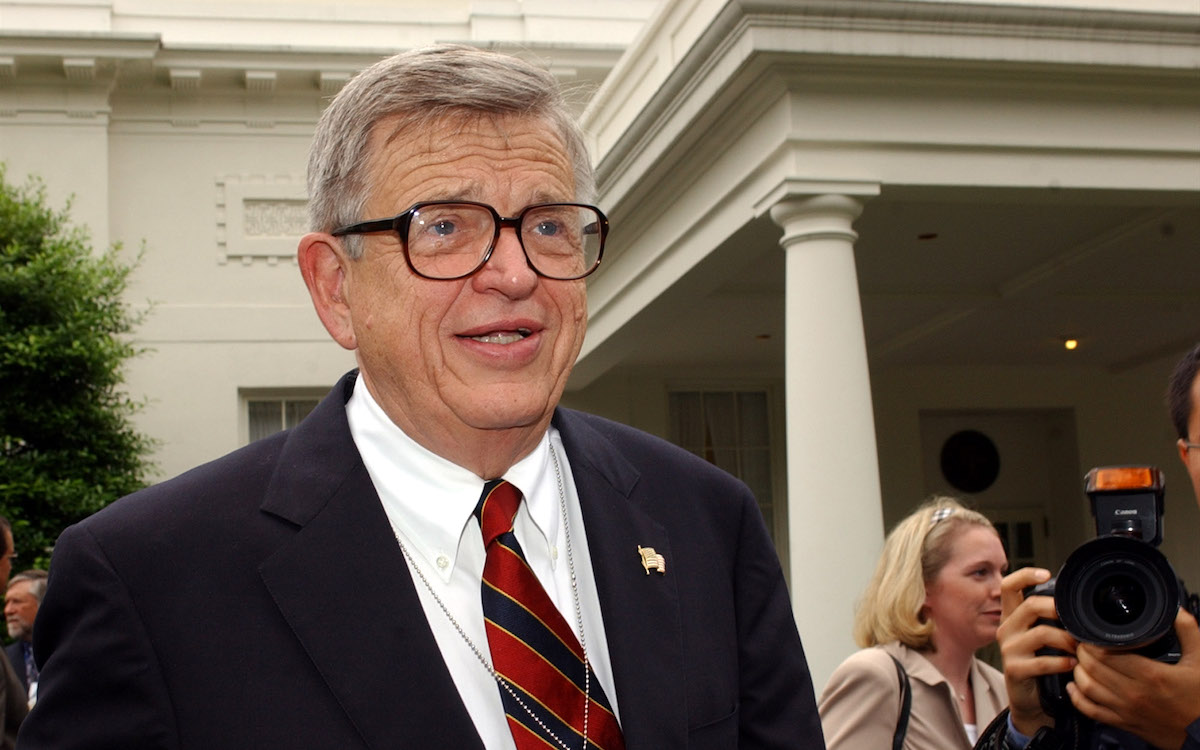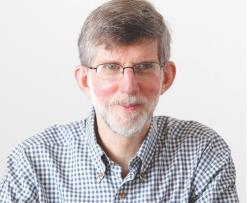In 2000, I didn’t realize until it was too late that my astronomically exaggerated proximity to presidential candidate George W. Bush would make me a target. For example, I had said in 1998 that women volunteers had run charitable enterprises in the 19th century, so women’s entrance into the corporate workforce had hurt the nonprofit world. Now, as Bush’s supposed “ear-whisperer,” my purported opposition to high-achieving businesswomen was newsworthy.
The solace I could take while being pummeled in liberal newspapers was that it was worse in the United Kingdom. Conservative Party leader William Hague and his associates, out of power, wanted to learn about “compassionate conservatism” and perhaps ride it to a parliamentary majority. My wife and I had two days of meetings in or near Parliament, three days of tourism, and four days of being lambasted by London newspapers.
For example, The Observer showed its precise observation of American geography and society: “On the endless plains of Indiana [Bush] repeated the phrase ‘compassionate conservatism’ 15 times. Bush had borrowed it from a man [who’s] got a beard. He’s called Marvin. What more need be said?” Something more, it turned out: I was a “born-again Christian who watched Bush from afar, on television, with a glow of satisfaction and a job in the White House awaiting him.” I purportedly had “a semi-political post as spiritual overseer of George Bush’s Texas.”
The new business cards—“spiritual overseer”— looked great. On the flight home, I read an older London publication, The Rare Jewel of Christian Contentment, first printed in the 1640s. Pastor Jeremiah Burrough wrote: “Make a good interpretation of God’s ways toward you. … Think that God perhaps has given you a trial to build your character. Perhaps you had your heart inordinately set on a particular selfish goal. Perhaps, had you succeeded, you would have used the opportunity to fall into sin.”
The rest of the presidential campaign mixed pleasure and pain. A Christian producer at CNN made sure its profile of me, just before the Republican convention, was fair. A 60 Minutes profile was the opposite. I felt like the pastor who prayed as a grizzly bear charged him, “Lord, please make a Christian out of this bear.” That very instant, the bear halted, clasped its paws, and prayed aloud, “Dear God, bless this food I am about to receive.”
At the GOP convention in Philadelphia, during which George W. Bush accepted his party’s nomination for president, delegates wore buttons crowing, “I’m a compassionate conservative.” At a lecture I gave at Washington University in October, however, 10 young women wore T-shirts stating on their fronts, “I’m a compassionate conservative because…” Hurrah, I’m finally becoming a heartthrob? Not exactly. As I started speaking, they turned their backs and showed me the continuation of their message: “…because I’m racist, sexist” and so forth. Yet they sat down after several minutes and politely listened. One of them gave me not the shirt off her back but an extra one the group had.
Given the closeness of the election, the Bush celebration/wake on election night in November had lows and highs. Television folks had set up a grandstand facing the crowd in front of the stately Texas capitol building. At 9 p.m. I climbed to the top so a BBC interviewer, assuming Al Gore had won, could sneeringly ask me, “Looking at the returns, would you agree that compassionate conservatism hasn’t much of a future?” As I began to answer, a roar from the Bush crowd indicated that Florida, declared by networks a Gore conquest, was once again in play—and so was compassionate conservatism.
Five weeks after the 2000 election, the U.S. Supreme Court confirmed the election of George W. Bush. On December 13 he gave his first speech as president-elect: “Together we will address some of society’s deepest problems one person at a time, by encouraging and empowering the good hearts and good works of the American people. This is the essence of compassionate conservatism.”
Eight days later, Bush met at Austin’s First Baptist Church with 30 “national faith-based leaders” and one journalist/historian. We sat in a circle on plastic chairs. Each person had 30 seconds to express directly to the president-elect his hopes for personal interaction with the new administration. I said I’d continue to edit a politically independent magazine, and added, “We’ll zing you at times.” Bush smiled and said, “Join the club.” He concluded with a wry comment: “I hope that a year from now, no one is going to be able to say that this was all just smoke and mirrors.”
Early in January 2001 the most prominent evangelical leader at that time, Prison Fellowship head Chuck Colson, sent me a letter fearing smoke and mirrors. He described the beginning of a Philadelphia project designed to fight crime, drugs, and other negative aspects of gang life: “We had a public meeting kicking the program off, and I talked about evangelizing the streets of Philadelphia, bringing people to Christ.” He wrote that his remarks had rankled other project heads, who then kicked Prison Fellowship out of its position as leader of the project.
Colson worried that the Bush “faith-based initiative” would also push out those with faith in Jesus. Colson wrote that, following the Philadelphia hassle, he “spoke with a very eminent social scientist and told him the story of the conversion [to Christ] of a young lad now out on the streets preaching and reading the Bible to members of gangs. I was thrilled by this evidence of a transformed life.” Colson said conversion was a “success,” but the eminent academic disagreed, saying other social scientists had to “peer-review” it.
Colson was one of the people who gathered at the northwest corner of the White House grounds on the cold, gray last Monday in January. About the same number of “national faith-based leaders” received badges, went through security, and were escorted to a dark-paneled, leather-chaired room. Staffers made sure a nun from New York, an imam from a Detroit mosque, and a long-bearded rabbi literally had seats at the table. Colson was off table. I stood at the back, where I belonged. Bush told the gathering about his goal: “Change lives by changing hearts. … I promise you I will stand up for what I believe … an initiative and a vision that will fundamentally change our country.”
Some who had spent much of their lives out in the cold asked hard questions. Bob Woodson, head of the National Center for Neighborhood Enterprise and a planner of Teen Challenge’s demonstration at the Alamo in 1995, said many Christian groups were suspicious of government. Steve Burger, head of the Association of Gospel Rescue Missions, noted the bureaucratic tendency to prefer “people in stainless steel buildings with Ph.D. degrees” to volunteers from churches.
Bush replied, “I fully understand the fears of people of faith.” He spoke of person-to-person compassion: “This was the core of America. Then government stepped in, and everyone said government could do it.” He offered his personal understanding of how change occurs: “I was lost and then I was found.” He surprised some in the room with his choice of John DiIulio, a very eminent social scientist from Philadelphia, to head the White House faith-based office. Journalists had speculated that evangelicals would get preference, so DiIulio’s Catholicism and emphasis on peer-review processes were political pluses.
Chuck Colson in his letter gave me a charge: “Bless you, dear Marvin. I hope you will keep your hand upon this because it is critical that the Bush administration get off to the right start.” In February I visited John, on leave from his University of Pennsylvania professorship. He and newly hired staffers padding around their freshly carpeted, high-ceiling office next to the White House. Badge photos on lanyards captured the deer-in-the-headlight look of driver’s license art. That was appropriate, since vehicles from many directions seemed intent on running them down.
Critics played it both ways: churches are so strong they’ll take over government, and so weak that government will take over them. I was on a combination business and fathering trip with my youngest son, Ben, who at age 10 swung around throughout our meeting on a revolving office chair. It was clear that John, overweight with some heart problems, was also swinging around. Now that he was Uncle Sam-I-am, reporters kept asking: Will you fund green eggs and ham? Is all this faith-based stuff a sham? Will some church get a new computer? Will that be fine with Justice Souter?
I was for decentralization: let individual taxpayers decide where they wanted their poverty-fighting money to go. John wanted centralized grant-making and said fundable programs could not have religious teaching or evangelism. I told him about a church-run program on budgeting for folks who had been on welfare or in prison. The instructor began by distinguishing among needs, wants, and desires. He quoted the Apostle Paul: “If we have food and clothing, we will be content with that,” and further explained his classifications by citing other Bible verses. The instructor taught about the need to pay debts by quoting from Psalm 37: “The wicked borrows and does not pay back, but the righteous is gracious.”
The students seemed impressed that they were not learning just the “seven habits for saving” or some other bestselling compilation of human lore, but wisdom imparted from God. Question: Was this religious instruction? Should it be eligible for a federal grant? Find out next time.
This is the sixth installment of an eight-part series on poverty and welfare reform in America. Click through for parts one, two, three, four, and five.

